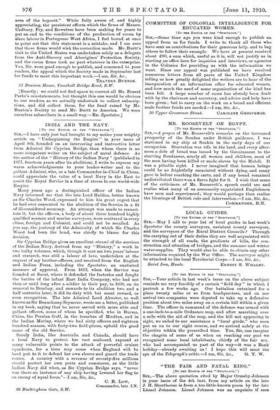INDIA AND THE NAVY.
To THE EDITOR 01! THE " SPECTATOR."' SIR,—I have only just had brought to my notice your weighty article on " Underpinning the Empire " in your issue of April 9th, founded on an interesting and instructive letter from Admiral Sir Cyprian Bridge, than whom there is no more competent writer on the subject of naval defence. As the author of the " History of the Indian Navy " (published in 1877, fourteen years after its abolition), I write to express my warm acknowledgments to your leader-writer and to the gallant Admiral, who, as a late Commander-in-Chief in China, could appreciate the value of a local Navy in the East to assist the Royal Service in a time of stress to our world-wide Empire.
Many years ago a distinguished officer of the Indian Navy informed me that the late Lord Halifax, better known as Sir Charles Wood, expressed to him his great regret that he had ever consented to the abolition of the Service in a fit of ill-considered economy. An attempt was made to resusci- tate it, but the officers, a body of about three hundred highly qualified seamen and marine surveyors, were scattered in every clime, foreign and Colonial, and could not be recalled. As you say, the jealousy of the Admiralty, of which Sir Charles Wood had been the head, was chiefly to blame for this decision.
Sir Cyprian Bridge gives an excellent resume of the services of the Indian Navy, derived from my "History," a work in two bulky volumes, which, though it cost me two years' labour and research, was still a labour of love, undertaken at the request of my brother-officers, and received from the English and Indian Press, including the Spectator, an unstinted measure of approval. From 1613, when the Service was founded at Surat, where it defended the factories and fought the battles of the infant East India Company, who had not then or until long after a soldier in their pay, to 1660, on its removal to Bombay, and onwards to its abolition two and a half centuries later, it did its duty with but scant reward, or even recognition. The late Admiral Lord Alcester, so well known as Sir Beauchamp Seymour, wrote me a letter, published in my book, saying that he never served with more able and gallant officers, some of whom he specified, who in Burma, China, the Persian Gulf, in the trenches of Mooltan, and in the Indian Mutiny, where we had sixty officers and eighteen hundred seamen, with forty-two field-pieces, upheld the good name of the old Service.
Surely India, like Australia and Canada, should have a local Navy to protect her vast seaboard, exposed at many vulnerable points to the attack of powerful cruiser squadrons, for a time may come when England will be hard put to it to defend her own shores and guard the trade routes. A country with a revenue of seventy-five millions should protect her own ports and commerce, as the little Indian Navy did when, as Sir Cyprian Bridge says, "never was there an instance of any ship having lowered her flag to an enemy of equal force."-1 am, Sir, &c., Commander, late I.N. 86 Buckingham Gate, S.W. C. R. Low,














































 Previous page
Previous page